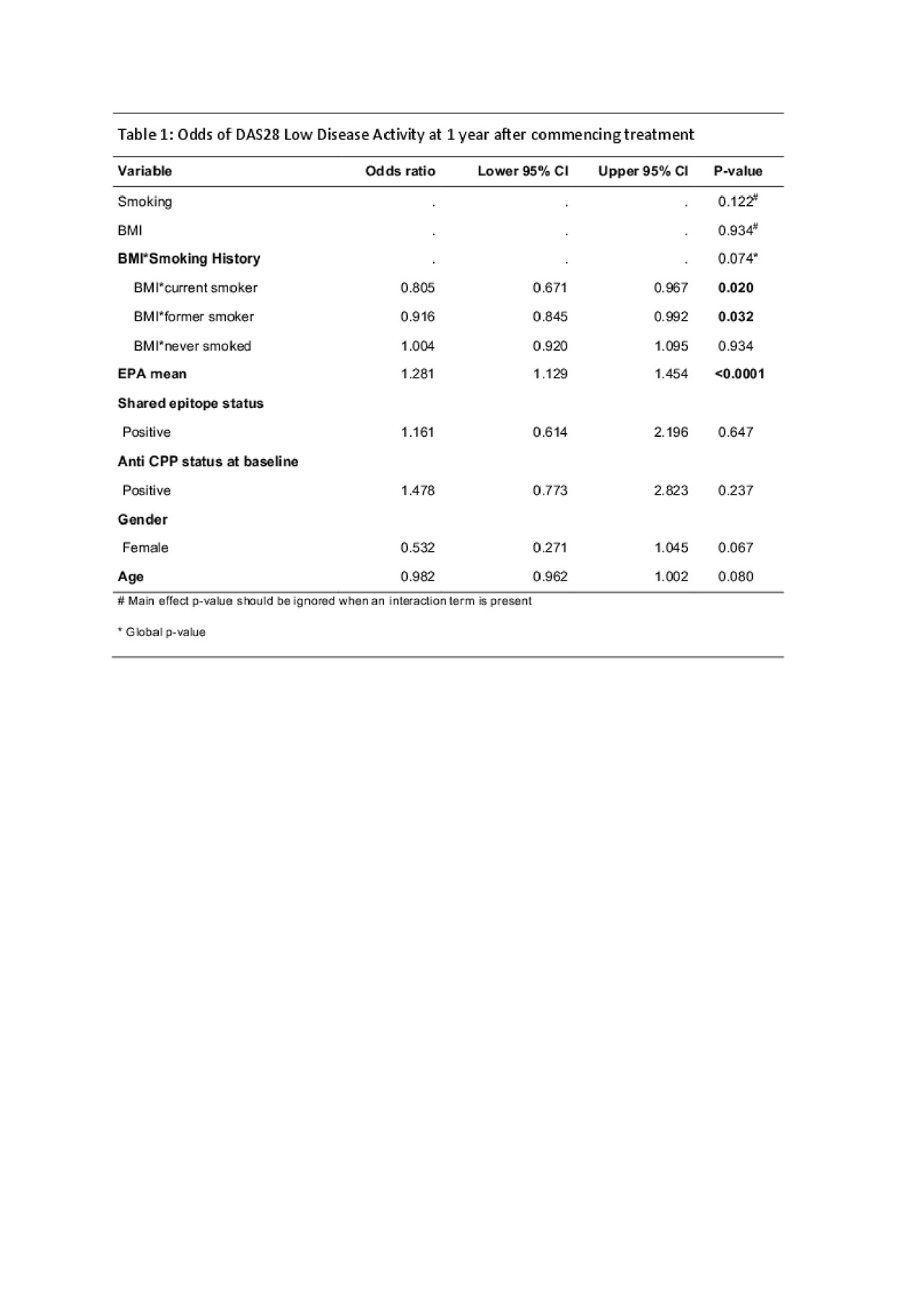Session Information
Session Type: Poster Session (Tuesday)
Session Time: 9:00AM-11:00AM
Background/Purpose: Among the potentially modifiable prognostic factors in RA, there is evidence for associations with smoking history, BMI and dietary fish oil supplementation. An integrated examination of these lifestyle factors as predictors of RA outcomes was undertaken in a single early RA cohort receiving standardised algorithm-directed treat-to-target DMARD therapy.
Methods: Consecutive patients attending the Early Arthritis Clinic at the Royal Adelaide Hospital with recent-onset RA according to the 1987 revised American College of Rheumatology criteria and with disease duration < 12 months were eligible. All patients commenced ‘triple therapy’ with methotrexate, sulfasalazine and hydroxychloroquine and received advice to take fish oil supplements at anti-inflammatory doses, except for 139 patients within this cohort of 339 who participated in a randomised placebo controlled trial (RCT) of fish oil supplementation. Prognostic variables for DAS28 remission and DAS28 low disease activity (LDA) at the 12 month visit (+/- 6 weeks window was allowed) were identified using multivariable logistic regression models, correcting for potential confounders (age, sex, RF and CCP status and shared epitope). Omega-3 status was assessed as plasma eicosapentaenoic acid (EPA) levels.
Results: Of 311 participants with complete data, 57.6% reached DAS28 LDA and 43.7% were in DAS28 remission at one year. Increase in plasma EPA was associated with an increase in the odds of being in DAS28 LDA (OR=1.28; p< 0.0001) and DAS28 remission (OR=1.22; p< 0.001). There was a statistically significant interaction between smoking status and BMI on DAS28 LDA. Increase in BMI was associated with a decrease in the odds of being in DAS28 LDA in current and former smokers, but had no impact on LDA in patients who had never smoked. There were no statistically significant associations with BMI or smoking history and DAS28 remission. While a 1kg/m2 increase in BMI was associated with a decrease in the odds of having DAS28 low disease activity at 1 year in current and former smokers, it had no impact in patients who had never smoked.
Conclusion: Among all prognostic factors, fish oil supplementation in early RA patients receiving T2T therapy is significantly associated with the greatest increased odds of achieving DAS28 LDA at one year. The effect modification by smoking status on the association of BMI with treatment outcomes in early RA strongly supports counselling for lifestyle modification in patients who have a smoking history, particularly if they are overweight.
To cite this abstract in AMA style:
Brown Z, Metcalf R, Bednarz J, Stavrou C, Spargo L, James M, Proudman S. Modifiable Factors Associated with Response to Treatment in Early Rheumatoid Arthritis [abstract]. Arthritis Rheumatol. 2019; 71 (suppl 10). https://acrabstracts.org/abstract/modifiable-factors-associated-with-response-to-treatment-in-early-rheumatoid-arthritis/. Accessed .« Back to 2019 ACR/ARP Annual Meeting
ACR Meeting Abstracts - https://acrabstracts.org/abstract/modifiable-factors-associated-with-response-to-treatment-in-early-rheumatoid-arthritis/

